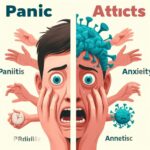The brain, often regarded as the epicenter of human existence, is a dynamic organ. Its ability to regenerate cells, known as neurogenesis, plays a pivotal role in cognitive functions, especially as we age. This article delves into the science of neurogenesis and offers actionable insights on enhancing brain health.
Understanding Neurogenesis
Neurogenesis, in simple terms, is the process through which new neurons or nerve cells are formed in the brain. This phenomenon is particularly prevalent in the hippocampus, a region associated with memory, learning, and spatial navigation.
- Hippocampus Functions:
- Memory relay
- Learning
- Spatial navigation
- Problem-solving
- Object-place memory (e.g., recalling where you placed your keys)
It’s crucial to note that occasional forgetfulness, like misplacing keys, doesn’t necessarily indicate a brain malfunction. Factors like diet, blood sugar levels, or even stress can temporarily impair memory.
Factors Influencing Neurogenesis
Several lifestyle choices and environmental factors can either promote or hinder neurogenesis. Here’s a comprehensive guide to understanding these factors:
1. Exercise
Regular and consistent exercise tops the list. Aerobic exercises, which increase oxygen intake, are particularly beneficial.
- Benefits of Aerobic Exercise:
- Enhances cognitive functions
- Boosts memory
- Improves spatial navigation
However, it’s essential to mix up your exercise routine. While high-intensity workouts have their merits, incorporating long walks or hikes can offer additional brain benefits.
2. Diet and Fasting
Diet plays a crucial role in brain health. Intermittent fasting and periodic prolonged fasting have shown potential in promoting neurogenesis.
Table: Dietary Impact on Brain Health
| Dietary Habit | Impact on Brain |
|---|---|
| Frequent Eating | Negative: Can lead to glucose metabolism issues |
| Intermittent Fasting | Positive: Stimulates brain repair and growth factors |
| Prolonged Fasting | Positive: Enhances brain function and repair mechanisms |
3. Cold and Heat Therapy
Both cold and heat therapies can stimulate neurogenesis. While cold therapy, like ice baths or cold showers, is more potent, saunas or hot showers also offer benefits.
4. Nutritional Supplements
Certain nutrients and supplements can support brain health:
- Omega-3: Found in fish oils and cod liver oil, it’s vital for brain structure.
- Vitamin B1 (Thiamine): Essential for brain function and preventing inflammation.
- Zinc: Supports cognitive functions and memory.
5. Probiotics
A healthy gut can lead to a healthy brain. Probiotics, found in fermented foods and specific supplements, can enhance brain function by improving gut health.
6. Sun Exposure
The sun, a natural source of vitamin D and infrared energy, can boost brain health. Over 50% of sunlight is infrared, which can penetrate the skull and increase melatonin, an antioxidant beneficial for the brain.
7. Sleep
Quality sleep is as crucial as its duration. Insomnia or reliance on stimulants can hinder neurogenesis.
8. Coffee Consumption
While excessive caffeine can be detrimental, moderate coffee consumption, rich in polyphenols, can support cognitive functions.
Practical Tips for Enhancing Brain Health
- Incorporate Exercise: Aim for a mix of high-intensity workouts and aerobic exercises.
- Dietary Choices: Opt for intermittent fasting and reduce carbohydrate intake.
- Embrace Therapies: Try cold showers or saunas occasionally.
- Supplement Wisely: Consume Omega-3, Vitamin B1, and Zinc supplements.
- Gut Health: Incorporate probiotics into your diet.
- Sun Exposure: Spend some time outdoors daily.
- Prioritize Sleep: Ensure 7-8 hours of quality sleep.
- Limit Caffeine: Enjoy your coffee but in moderation.
Conclusion
Brain health, undeniably crucial for overall well-being, is significantly influenced by our lifestyle choices. By understanding the science of neurogenesis and making informed decisions, we can pave the way for enhanced cognitive functions and a healthier brain.















